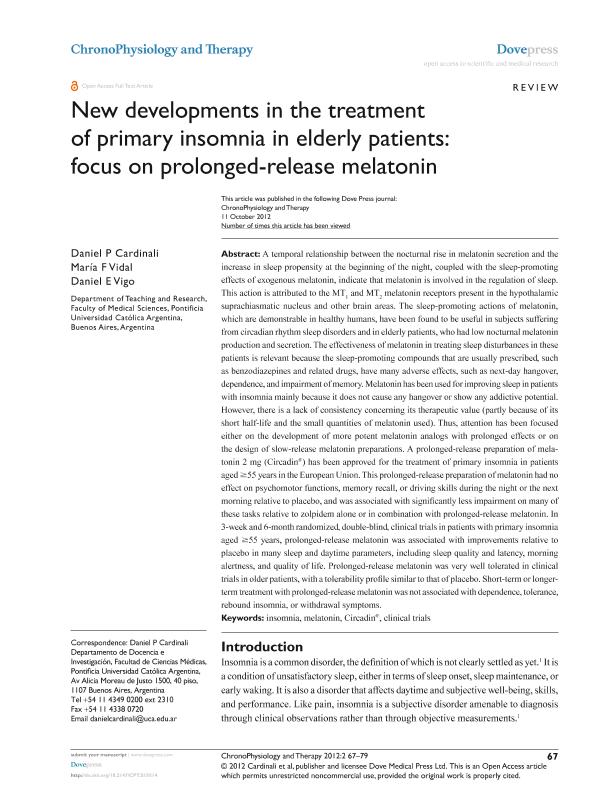Mostrar el registro sencillo del ítem
dc.contributor.author
Cardinali, Daniel Pedro

dc.contributor.author
Vidal, Maria Florencia

dc.contributor.author
Vigo, Daniel Eduardo

dc.date.available
2023-05-17T14:28:20Z
dc.date.issued
2012-10
dc.identifier.citation
Cardinali, Daniel Pedro; Vidal, Maria Florencia; Vigo, Daniel Eduardo; New developments in the treatment of primary insomnia in elderly patients: focus on prolonged-release melatonin; Dove Press; ChronoPhysiology and Therapy; 2; 10-2012; 67-79
dc.identifier.issn
2230-2026
dc.identifier.uri
http://hdl.handle.net/11336/197793
dc.description.abstract
A temporal relationship between the nocturnal rise in melatonin secretion and the increase in sleep propensity at the beginning of the night, coupled with the sleep-promoting effects of exogenous melatonin, indicate that melatonin is involved in the regulation of sleep. This action is attributed to the MT1 and MT2 melatonin receptors present in the hypothalamic suprachiasmatic nucleus and other brain areas. The sleep-promoting actions of melatonin, which are demonstrable in healthy humans, have been found to be useful in subjects suffering from circadian rhythm sleep disorders and in elderly patients, who had low nocturnal melatonin production and secretion. The effectiveness of melatonin in treating sleep disturbances in these patients is relevant because the sleep-promoting compounds that are usually prescribed, such as benzodiazepines and related drugs, have many adverse effects, such as next-day hangover, dependence, and impairment of memory. Melatonin has been used for improving sleep in patients with insomnia mainly because it does not cause any hangover or show any addictive potential. However, there is a lack of consistency concerning its therapeutic value (partly because of its short half-life and the small quantities of melatonin used). Thus, attention has been focused either on the development of more potent melatonin analogs with prolonged effects or on the design of slow-release melatonin preparations. A prolonged-release preparation of melatonin 2 mg (Circadin®) has been approved for the treatment of primary insomnia in patients aged $55 years in the European Union. This prolonged-release preparation of melatonin had no effect on psychomotor functions, memory recall, or driving skills during the night or the next morning relative to placebo, and was associated with significantly less impairment on many of these tasks relative to zolpidem alone or in combination with prolonged-release melatonin. In 3-week and 6-month randomized, double-blind, clinical trials in patients with primary insomnia aged $55 years, prolonged-release melatonin was associated with improvements relative to placebo in many sleep and daytime parameters, including sleep quality and latency, morning alertness, and quality of life. Prolonged-release melatonin was very well tolerated in clinical trials in older patients, with a tolerability profile similar to that of placebo. Short-term or longer-term treatment with prolonged-release melatonin was not associated with dependence, tolerance, rebound insomnia, or withdrawal symptoms.
dc.format
application/pdf
dc.language.iso
eng
dc.publisher
Dove Press

dc.rights
info:eu-repo/semantics/openAccess
dc.rights.uri
https://creativecommons.org/licenses/by-nc-sa/2.5/ar/
dc.subject
insomnia
dc.subject
melatonin
dc.subject
circadin
dc.subject
clinical trials
dc.subject.classification
Fisiología

dc.subject.classification
Medicina Básica

dc.subject.classification
CIENCIAS MÉDICAS Y DE LA SALUD

dc.title
New developments in the treatment of primary insomnia in elderly patients: focus on prolonged-release melatonin
dc.type
info:eu-repo/semantics/article
dc.type
info:ar-repo/semantics/artículo
dc.type
info:eu-repo/semantics/publishedVersion
dc.date.updated
2023-05-17T11:24:02Z
dc.journal.volume
2
dc.journal.pagination
67-79
dc.journal.pais
Estados Unidos

dc.description.fil
Fil: Cardinali, Daniel Pedro. Pontificia Universidad Católica Argentina "Santa María de los Buenos Aires"; Argentina. Consejo Nacional de Investigaciones Científicas y Técnicas; Argentina
dc.description.fil
Fil: Vidal, Maria Florencia. Pontificia Universidad Católica Argentina "Santa María de los Buenos Aires"; Argentina. Consejo Nacional de Investigaciones Científicas y Técnicas; Argentina
dc.description.fil
Fil: Vigo, Daniel Eduardo. Consejo Nacional de Investigaciones Científicas y Técnicas; Argentina. Pontificia Universidad Católica Argentina "Santa María de los Buenos Aires"; Argentina
dc.journal.title
ChronoPhysiology and Therapy
dc.relation.alternativeid
info:eu-repo/semantics/altIdentifier/url/http://www.dovepress.com/articles.php?article_id=11258
dc.relation.alternativeid
info:eu-repo/semantics/altIdentifier/doi/http://dx.doi.org/10.2147/CPT.S15514
Archivos asociados
